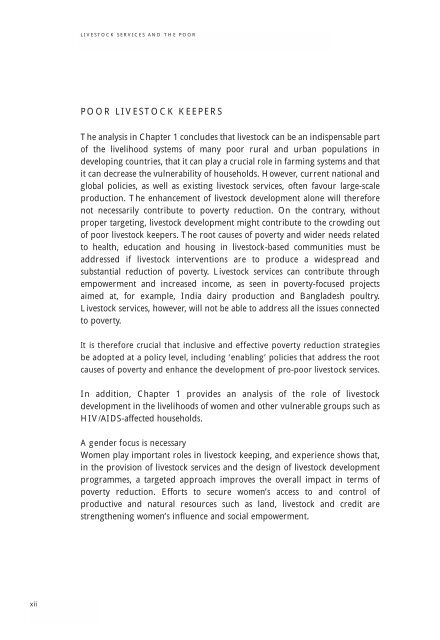Livestock Services and the Poor: A global initiative - IFAD
Livestock Services and the Poor: A global initiative - IFAD
Livestock Services and the Poor: A global initiative - IFAD
Create successful ePaper yourself
Turn your PDF publications into a flip-book with our unique Google optimized e-Paper software.
xii<br />
LIVESTOCK SERVICES AND THE POOR<br />
<strong>Poor</strong> <strong>Livestock</strong> Keepers<br />
The analysis in Chapter 1 concludes that livestock can be an indispensable part<br />
of <strong>the</strong> livelihood systems of many poor rural <strong>and</strong> urban populations in<br />
developing countries, that it can play a crucial role in farming systems <strong>and</strong> that<br />
it can decrease <strong>the</strong> vulnerability of households. However, current national <strong>and</strong><br />
<strong>global</strong> policies, as well as existing livestock services, often favour large-scale<br />
production. The enhancement of livestock development alone will <strong>the</strong>refore<br />
not necessarily contribute to poverty reduction. On <strong>the</strong> contrary, without<br />
proper targeting, livestock development might contribute to <strong>the</strong> crowding out<br />
of poor livestock keepers. The root causes of poverty <strong>and</strong> wider needs related<br />
to health, education <strong>and</strong> housing in livestock-based communities must be<br />
addressed if livestock interventions are to produce a widespread <strong>and</strong><br />
substantial reduction of poverty. <strong>Livestock</strong> services can contribute through<br />
empowerment <strong>and</strong> increased income, as seen in poverty-focused projects<br />
aimed at, for example, India dairy production <strong>and</strong> Bangladesh poultry.<br />
<strong>Livestock</strong> services, however, will not be able to address all <strong>the</strong> issues connected<br />
to poverty.<br />
It is <strong>the</strong>refore crucial that inclusive <strong>and</strong> effective poverty reduction strategies<br />
be adopted at a policy level, including ‘enabling’ policies that address <strong>the</strong> root<br />
causes of poverty <strong>and</strong> enhance <strong>the</strong> development of pro-poor livestock services.<br />
In addition, Chapter 1 provides an analysis of <strong>the</strong> role of livestock<br />
development in <strong>the</strong> livelihoods of women <strong>and</strong> o<strong>the</strong>r vulnerable groups such as<br />
HIV/AIDS-affected households.<br />
A gender focus is necessary<br />
Women play important roles in livestock keeping, <strong>and</strong> experience shows that,<br />
in <strong>the</strong> provision of livestock services <strong>and</strong> <strong>the</strong> design of livestock development<br />
programmes, a targeted approach improves <strong>the</strong> overall impact in terms of<br />
poverty reduction. Efforts to secure women’s access to <strong>and</strong> control of<br />
productive <strong>and</strong> natural resources such as l<strong>and</strong>, livestock <strong>and</strong> credit are<br />
streng<strong>the</strong>ning women’s influence <strong>and</strong> social empowerment.

















